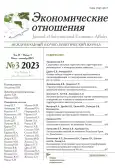Measuring and analyzing the impact of oil price fluctuations on Iraq's gross domestic product (GDP) variable by using the ARDL model for the period (1970–2020)
- Authors: Mahdi A.R.1, Imad Y.H.1, Najwan M.A.1
-
Affiliations:
- Wasit University, College of Administration and Economics
- Issue: Vol 13, No 3 (2023)
- Pages: 585-600
- Section: Articles
- URL: https://bakhtiniada.ru/2587-8921/article/view/146689
- DOI: https://doi.org/10.18334/eo.13.3.118788
- ID: 146689
Cite item
Abstract
The Iraqi economy suffers from the problem of increasing dependence on the rentier resource, which represents the greatest proportion of the recent eras of contribution to the gross domestic product, and therefore this resource has a longitudinal dominance to influence the above variable, the studied time series extends from 1970-2020, In this article use the standard analysis approach was adopted in order to identify the long and short-term effects and analyze the interrelationships linking the studied variables. In light of the assumptions of the economic theory and when using the ARDL model, it becomes clear that there is a co-integration between oil prices and GDP based on the calculated F-test value, which is greater than the upper boundary value. Joint integration between the two studied variables, the Bound Test table. The results of the standard analysis are shown that all the variables’ coefficients are in line with the assumptions of the economic theory, as an increase in oil prices by 1% will lead to an increase in the gross domestic product by approximately 6.15%. A positive relationship with the gross domestic product, as well as the cumulative sum test and its squares, which shows that the behavior of The study is within critical limits and the model does not suffer from possible structural problems in the future.
About the authors
Alwan Rahima Mahdi
Wasit University, College of Administration and Economics
Author for correspondence.
Email: najali@uowasit.edu.iq
Yasir Hussein Imad
Wasit University, College of Administration and Economics
Email: najali@uowasit.edu.iq
Mohamed Ali Najwan
Wasit University, College of Administration and Economics
Email: najali@uowasit.edu.iq
References
- Abd al-Rahman Karim Abd al-Ridha al-Tai Analysis of the Reality of the Relationship Between International Oil Prices and Economic Growth, Iraq: A Case Study for the Period 1970-2015 // Wasit Journal for Human Sciences. – 2018. – № 14(1). – p. 715-762.
- Chahrazed Madjdoubi, Aicha Zidelmel Affane The effect of oil price fluctuations on the GDP in Algeria: using the Ecm error correction model for the period from 1999-2013 // Journal of the Economist. – 2017. – № 4(5). – p. 1101-1132.
- Rahim Hassouni Ziyara, Morteza Hadi Janandi Naji Fluctuations of global crude oil prices and their effect on inflation and economic growth in Iraq. A standard study for the period 1988– 2015 // Journal of Administrative and Economic Sciences. – 2018. – № 105(32). – p. 430 - 454.
- Anthony Msafiri Nyangarika, Alexey Yurievich Mikhaylov, Bao-jun Tang Correlation of Oil Prices and Gross Domestic Product in Oil Producing Countries // International Journal of Energy Economics and Policy. – 2018. – № 8(5). – p. 42-48.
- María Dolores Gadea, Ana Gómez-Loscos, Antonio Montañés Oil Price And Economic Growth: A Long Story?. , 2016.
- The World Bank, the Central Bank of Iraq, the Central Agency for Statistics and Information Technology, bulletins and multiple years.
- Dickey David A. Stationarity Issues in Time Series Models. Statistics and Data Analysis. [Электронный ресурс]. URL: https://bodhi-root.github.io/public-wiki/86abab33aec0cb63af3010f0b487bb06/ADF-Explained-by-Dickey.pdf (дата обращения: 26.07.2023).
- Phillips P. C. B. Time series regression with a unit root // Econometrica. – 1987. – № 55. – p. 277-301.
- Ozturk I., Acaravci A. Electricity consumption and real GDP causality nexus: evidence from ARDL bounds testing approach for 11 MENA countries // Apple Energy. – 2011. – № 88. – p. 2885–2892.
- Pesaran M.H., Shin Y. An autoregressive distributed-lag modeling approach to cointegration analysis // Econ Soc Monogr. – 2012. – № 31. – p. 371–413.
- Vrieze S.I. Model selection and psychological theory: a discussion of the differences between the Akaike Information Criterion (AIC) and the Bayesian Information Criterion (BIC) // Psychological Methods. – 2012. – № 17 (2). – p. 228–243..
Supplementary files








